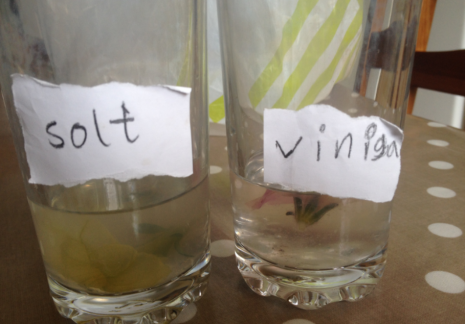Whilst I’m always wanting you to think bigger (and it’s amazing what you can achieve in just 6 months, or even just 6 weeks) it’s always important to remember that time is still important. Patience.
As a case in point, here’s a very cute picture from my 7 year old (native speaker) niece.

So the next time your kids make a spelling “mistake” don’t worry. It’s how we learn and it takes some time.
And even native speakers make them. 🙂
Get your plan in place, work through the baby steps, add dash of patience and you’ll be there before you know it.
P.S. This is for her school science project. Growing flowers in regular water, salt water and vinegar (acidic) water to see which grows better. Seven years old, pretty good eh!



I always have to step back and get the local Chinese staff to step back and realize that much of what they are expecting the kids to achieve is nearly as difficult as the stuff NATIVE English speaking kids are doing in English and the Native kids have the advantage of being NATIVE!!!
I’ll tell you one thing, though. I have some super spellers in my young classes (I think these kids are 6 – 7 years old now and we’ve been doing Genki Phonics twice a week for 4 months now – we are through “sh” now). During the dictation portion of the phonics, I’ll throw in some words that contain double letter endings like CK, LL, ZZ, etc. I briefly highlighted some simple rules about when these often occur (maybe a quick one minute note). Now I say a word and then slowly say the word by sound (for instance: P A K), the kids will either just straight away right down “pack” or raise their hands and check with me if they should write CK at the end. I was amazed at how quickly they picked up the double LL ending.
I like to challenge them and push them, but I have patience. The local teachers often comment that Genki Phonics and the spelling is too hard for the kids because the kids often struggle with the vowel sound in the words (USUALLY WITH THE SPELLING PART). I realized a better way to help them would be to use the gestures so they can differentiate between “a, e” “e, i” “a, o” “o, u” etc.
Then other times I get a little impatient (though this is a side-effect of my poor discipline skills). I tried to do the fruit market song yesterday (to review fruits and sort of introduce THIS, THAT). I just couldn’t get this class to sing and then dance. It always just becomes running around and tackling each other. I was very frustrated.
Update on the class I took over from a departing teacher. The kids are young (4-5 years old), with a couple of the kids being stubborn, yet one of those kids just LOVES singing the songs (so far we’ve done How Old Are You and Superhero). The whole group of kids is INCREDIBLE at singing the songs. Nice and loud and clear. Best singing class so far and they are the youngest I’m teaching right now. (I did have a younger class which I started using Genki with right from the beginning and they were OK at the singing AND super at the speaking and mixing and matching words and sentences).
Ha, enough RAVING.
PATIENCE, PATIENCE, PATIENCE. I need more of that.
Seeing this it’s a relief! It makes me relax and keek doing my job with all the effort I always put in it but less stress!
Thanks a bunch for always being there, Richard!
Yesterday I had a Superhero lesson with my 5-6 year olds. One of the students said, “I wish the English classes were every day!” She doesn’t cope well with everything, but she doesn’t care about it. The most important thing she enjoys it and set an example of patience for me!
That’s cute. IF children did everything perfectly, a teacher’s job would be a bit boring, wouldn’t it? 🙂
It’s just as important that they’re enthusiastic about discovering the world, as your niece obviously is. So yes, we don’t want to quash that enthusiasm by fussing too much about spelling, I think it’s better to make spelling into a fun activity at another time rather than correcting everything they do.